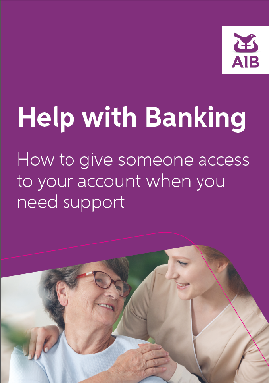Help Manage your Banking
This section covers Power of Attorney (POA), Enduring Power of Attorney (EPOA), Office of Care and Protection and Third Party Authority
The information on this page relates to Northern Ireland Only
Nobody wants to think there may be a time when they can’t look after their own personal and financial affairs. But if we need support, or in turn we need to support a loved one, it’s important to put the right protections in place for everyone.
To make decisions on behalf of someone else requires certain granted legal authority. We’re here to help and below you’ll find more about your options and how to get them set up:
- Power of Attorney
- Office of Care and Protection
- Third Party Support
Which option is most suitable to my situation
Options available |
Third party support | General Power of Attorney | Enduring Power of Attorney | Office of Care and Protection |
| My Dad has broken his leg and cannot walk for 2 months | Yes | Yes | No | No |
| My Mum is planning for her future and would like reassurance her banking needs will be met | Yes | Yes | Yes | No |
| My Aunt has been diagnosed with early stages of dementia but no mental capacity issues, what can I do to help? | No | Yes | Yes | No |
| My Uncle has been diagnosed with terminal cancer and wants a family member to help with his Banking | No | Yes | Yes | No |
| I am a carer and my patient has mental capacity issues, she has no family. | No | No | No | Yes |
Contact Us
Please contact us for further information. Our details can be found here
How do I register a Power of Attorney with the bank?
Our staff in each of our branches are here to help.
Please contact us for further information on any of the topics below:
You/The Attorney(s) will need to bring the following documents to the branch:
- The original of the full General Power of Attorney/Enduring Power of Attorney document or a copy certified by a solicitor;
- 2 forms of identification for the Attorney to prove identity and residence - Click here for a full list of accepted ID
- Attorneys who are not resident in the UK must provide two separate forms of proof of address, In addition to the two forms of identfication as stated above
The Attorney will need to complete additional documentation with a member of staff at the branch.
Please note that AIB (NI) can only accept Powers of Attorney which are governed by the laws of Northern Ireland.
It will take time for us to process this documentation, but our staff in the branch will keep the Attorney up to date on the progress of this and will also write to the Attorney to confirm when the General Power of Attorney/Enduring Power of Attorney is in place. We will also inform any other departments in AIB (NI) that need to know, and they will be in touch if necessary.
How to access Online Banking with a POA
- An Attorney or someone appointed under a court order may be able to access the account holders account information online.
- The access granted will be subject to a number of factors which will be explained in more detail at the time an application is received.
Change in Circumstances
There are a number of changes that may affect the Power of Attorney and/or the arrangement in place with the bank. For example, if the attorney decides they no longer want to fulfil the role, the account holder loses mental capacity, or you decide that you (the Donor) no longer wish for the arrangement to remain in place, the arrangement with the bank will need to be reviewed and amended.
It is important to let us know as soon as there is any change to circumstance so that we can take the appropriate action.
Appointing an Attorney
- As there are different types of Power of Attorney, it is important you use the correct one for your situation.
- You will need to seek independent legal advice from your solicitor or Advice NI.
- For further information please refer to the Home, Care and Community section of the NI Direct Government Services website.
What will change about daily banking
This table shows the potential changes on the day to day banking on the account.
Donor has mental capacity |
Donor lacks mental capacity |
|
| Name on account | The account will remain in the Donor’s name | The account will change to being described as ‘[Attorney‘s name] as Attorney for [Donor’s name]. |
| Debit Card | Both Donor and Attorney can have cards | Only Attorney will have debit card |
| Online/Phoneline Banking | Either Donor or Attorney can have access* (Attorney access will be limited) | Full access may be granted to the Attorney only* |
| Regular Payments/Direct Debit | Both Donor and Attorney are able to set up/amend/cancel any regular payments and direct debits | Only Attorney will have ability to set up/amend/cancel any regular payments and direct debits* |
| Chaps Payments | Both Donor and Attorney are able to authorise chaps payments | Only Attorney will have ability to authorise chaps payments* |
| Cheque books | As Attorney you will be able to sign cheques from the Donor’s cheque book | A new cheque book will be ordered and sent to you if you are sole Attorney or to the first Attorney’s address |
| Donor’s signing rights | The Donor will still be able to sign on their account | The Donor will not be able to sign. We will only accept an Attorney‘s signature on the Donor’s account |
| Statements | As Attorney you can ask for duplicate statements to be sent to you but we cannot amend the original statement address |
All statements will be sent to the sole or first Attorney’s address |
*Subject to any restrictions within attorney documentation
Frequently Asked Questions (FAQs) in relation to Enduring Powers of Attorney:
- What if an Attorney’s circumstances change?
- What happens if the donor dies?
- What happens if you want to cancel the Power of Attorney?
- What happens if the Donor has lost mental capacity after the Power of Attorney has been registered with AIB (NI)?
- What happens if a Power of Attorney has restrictions on how an Attorney can act for the Donor?
- What can a person do if they have concerns about the donor’s account?
- What should I do if I have concerns about the actions of an Attorney?
- Where will any correspondence be delivered?
External Support
You’ll find links and contact details for a range of Government, voluntary and community sector organisations who can provide direct services and support by clicking here.


